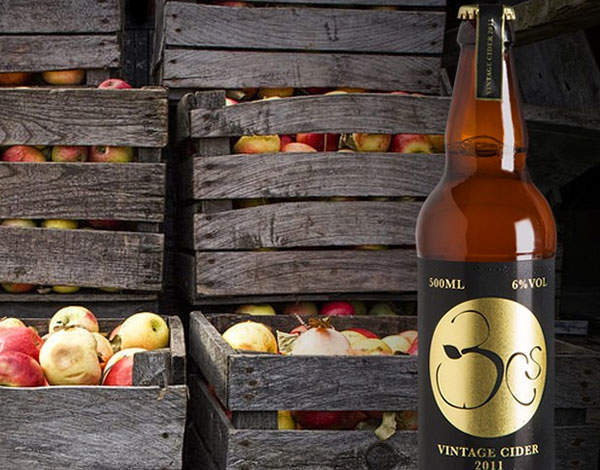

Now before you start chuckling to yourselves, the 3Cs in 3Cs Cider stands for 3 Chaps who are making a cider from 3 Counties. Disappointingly, Somerset does not feature in this crowd, but I will put my regional bias to one side.
We should come clean at this point and say that one of the Cs is our very own William Sitwell and along with Jasper Galloway and Toby Grafftey Smith he has created a cider using some of our older, less well-known English apple varieties, including Harry Masters and Chisel Jersey. No Granny Smiths here.
I don’t have a sweet tooth, so I like my champagne to have a low dosage and my white wine to be very dry. The same principles apply to cider: your standard Bulmers or Magners are too sweet and indeed many of the ciders that are on the market at the moment err on the side of sweetness.
3Cs does not: it is a dry cider with an authentically farmy edge. During a taste test in the office one particularly astute guinea pig detected a hint of hay on the palate. Whether it actually exists as a tasting note or not is as yet undetermined but it nicely illustrates the rural feel.
Sitwell suggests that the cider would go particularly well with a Sunday roast – particularly pork or chicken – but if you are not a huge fan of a standard roast with all of the trimmings, here is a recipe of mine that not only uses a splash of the cider during the cooking process but will also go perfectly with a nice, cold glass of the stuff over the weekend.
3Cs Cider is available exclusively at Fortnum & Mason and costs £3.90 per bottle
Pork loin medallions with a cider cream sauce (serves two)
5 pork medallions per person (obviously if you want more, make more)<br />200ml cider
200ml crème fraiche
A little stock (chicken or vegetable)
Salt and pepper to taste
Don’t ever buy ready-cut pork medallions unless you are at a butcher and they are cutting them for you there and then; the best thing to do is to buy a full loin and slice it at home. That way you can choose the thickness of your pieces and it is much more cost effective. Should you have too much meat, it freezes perfectly well and will give you another meal at a later stage.
This is a very simple meal: the only thing that requires any time at all is making the mash or roasties. If you do, prepare your potatoes first and get them boiling before you start to cook anything else. Medallions are normally no more than a few centimetres thick and take only a few minutes per side to cook.
Melt some butter or heat a little oil in a frying pan. Add your pork when the pan is good and hot. Allow the meat to caramelise nicely before turning. Because I am lazy and don’t like washing up, I keep the medallions in the pan at this point and add the cider around the pork. This deglazes the pan and incorporates the beautiful caramelized pork juices into the sauce. It also keeps the meat nice and moist as you are now essentially poaching the second side of the medallion.
Add a little stock at this point, turn the heat down to low and spoon in the crème fraiche. You can use cream here if you’d prefer, but I find that crème fraiche is a little lighter. Allow the crème fraiche to melt into the reduced cider and stock forming a beautifully silky cream sauce. If the sauce thickens too much you can loosen with either a little more cider or some warm water. Season to taste with salt and pepper and that is it.
Your medallions are just cooked and coated in a beautiful sauce ready to be served with your mashed potato (or roasties if you prefer) and something green. I like to quickly cook some Savoy cabbage in pan with just a dash of water and some minced garlic before adding a little butter, salt and pepper to serve.
If you want to make the dish a little more complex there are two variations to the sauce that I have tried before and feel work well. You can add a little sliced apple to the pan after it has been deglazed. Thinly sliced apple will soften down nicely and will add a nice hint of tartness, but some don’t like the addition of fruit to a savoury meal so I will leave this to your discretion. You can also finish the sauce with a teaspoon of grain mustard, if you want a little extra complexity.
Whichever version you plump for it will go beautifully with the remaining cider, assuming you haven’t polished the bottle off while cooking. A lovely low-key, yet luxurious weekend meal.







